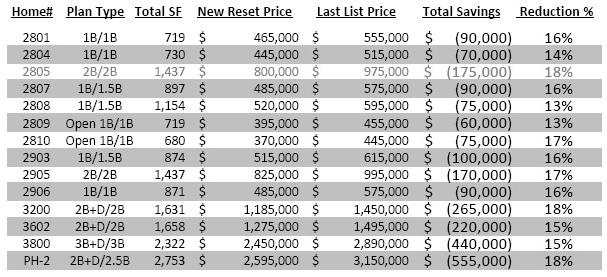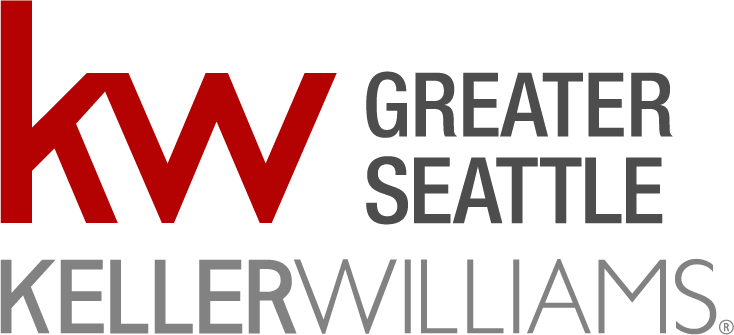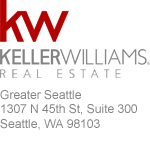Olive 8 Pricing Update
The Olive 8 Condominium, a luxury downtown Seattle condo, released a sample of its new prices as part of its re-energized marketing strategy this morning. The new pricing strategy includes reductions across the board that vary from about 15% to more than 25% on some homes, according to Julie McAvoy, the Community Sales Director for Olive 8.
Sample Price List (January 2011):

The new price list comes out about a year after prior reductions that ranged from 10-15% and last fall an auction helped sellout targeted inventory below the 27th floor, according McAvoy and NWMLS history. She estimates the total reductions in aggregate now range from 30-40% below presale pricing in 2007. “It a compelling opportunity for savvy homebuyers,” said McAvoy. “With prices correcting, timing the market may now have more to do with securing preferred selection and historically low interest rates versus anticipating further price cuts. I think we’re at a pivotal time in the center-city (Seattle) housing market and each community has a unique relationship within it.”
David Thyer, President of RC Hedreen Company and developer of Olive 8 says he monitors market values but acknowledges the only price that matters is the one that a buyer wants to pay. “We’re not inclined to further discount given recent sales comps in the building,” he said. “We know Olive 8 provides a great value today and we’re working our way up the building. Our three year construction loan extension provides us the time to sell into an improving marketplace over the next two years or so. Fortunately, we’ve saved our best inventory.”
McAvoy reports 10 new sales have been accepted so far in 2011 and active negotiations are taking place on several other homes. “I think buyers and sellers are finding better balance in supply and demand at Olive 8 and elsewhere,” she said. “It’s a signal that the market is stabilizing and an increase in sales means buyers are becoming more confident in home values.”
View available Olive 8 Condo homes for sale.
Disclaimer: Olive 8 is an advertiser of The Seattle Condo Blog at time of publication.





Excellent Olive 8 market report Ben. Looks like the market has had a serious impact on property values in your area.
We’re seeing similar if not deeper discounting in the Tacoma condo market as well. A quick nwmls check of one of my favorite buildings on dock street, shows a recent sale of a 1200 sq ft condo @ $358,410. Down from $530,630 in 2008.
It’s a similar scene throughout most of the downtown Tacoma condo market.
I’m watching the East side and downtown Seattle markets as they will most likely recover well in advance of our local condos.
Why won’t you post the blog I recently sent? I believe it is because you know its true! Your in the developer’s back pocket or front zipper 🙂
Hi Bob,
Thank you for your recent comment. If you previously commented, it may have been caught by the spam comment filter, and if so, it would have been removed automatically. If that’s the case, I apologize and encourage you to re-post your comments again.
If you sent a blog article for posting, as a rule, we do not publish unsolicited articles. That said, I do not recall receiving any requests recently.
We are not in the pockets, back or otherwise, of the developers and have no affiliation with any developer. We do, however, accept advertisements from marketing/sales firms, but that does not influence our coverage or reporting.
– Ben
Ben,
Thank you for the reply. It just seems that no one is really looking closely at the true marketing ploy of Olive 8.
Below is a accurate show of the true prices:
“There has been a lot of buzz in the local real estate scene recently after Olive 8 announced their “reset” marketing strategy for 2011, following the developer’s switch from Coldwell Banker Bain to Realogics just before Christmas.
One of the cornerstones of the campaign appears to be the “Reset at Olive 8? video at right that was posted on their site last week.
The MC in the video is one Tom Kelly, billed as a “Nationally Syndicated Columnist, Author.” He proclaims that “things are looking up,” and closes with the declaration that “We’ve all said to ourselves, ‘I wish I would have bought when I had the opportunity.’ Well, I think we’re gonna be saying that again.”
If we’re going to listen to advice about the future from someone, I think it’s instructive to look at some of their past advice to see what kind of track record they have. So what’s Tom Kelly’s record? Surprise! He’s been saying “buy, buy, buy” consistently since 2005.
October 2005: “…the reality of a significant drop in home prices and a rise in inventory is rather remote.”
October 2006: “local prices are not headed backward or even close to a ’soft landing.’ …the down period in the Puget Sound will mean slower, not negative, appreciation.”
Given that the point of the video is to sell you on the idea of buying a very expensive luxury condo, it’s full of all kinds of other dramatic claims about the downtown housing market, including Dick Hedreen (CEO of RC Hedreen, the Olive 8 developer) boldly predicting that “there will be a housing shortage in downtown Seattle.” Of course, none of these claims are backed up with any hard data.
Over at Urbnlivn, Matt posted the new “reset” pricing yesterday, and to be honest, I don’t see anything to get excited about. I spent a little time going through the King County Records for Olive 8 to pull up the sale prices of comparable units that have already sold. Here’s what I found:
Olive 8 “Reset” Pricing (go find this spreadsheet on the web and take a look. I was unable to copy and paste it.”.
Only one floorplan has a “reset” price lower than the pre-auction sale price just a few floors down (2×10). The “reset” price on the other 8 floorplans are an average of 6.3% higher than the pre-auction prices. Compared to the prices that the homes just sold for at auction in November, the new “reset” pricing averages over 25% higher. What a deal.
Apparently the developer really believes the rah-rah sales-speak in the video, if they’re asking 25% over the proven open market value of the units that just sold. Plus, according to Matt’s take, “it sounds like they’re not going to budge much on pricing now that they’ve reset.”
Good luck with that. Olive 8 may indeed have “25% of all new condominium inventory in downtown Seattle,” but that doesn’t mean much if the demand for brand new luxury condos is tapped out.”
Question: Why is the owner of Olive 8 purchasing units in Olive 8 under an LLC? Correct me if I’m wrong, but I believe he is attempting to create a “market value” above what is actually demanded of the current housing market. In buying his own units at unreasonably high prices, it looks as if they’re worth that much and allows his sales team to advertise as such. So, when a buyer comes along and believes comparable units to the one they are buying were purchased at higher prices (unknown to the buyer that it was the owner of the building who purchased them), this buyer would believe his is worth that much as well. Unfortunately, as the owner of Olive 8 cannot occupy the several units he’s purchased under his LLC, he will have to resale them once more units of Olive 8 are sold. Essentially then, pulling the rug from under those individuals who bought comparable units. Unfortunately for the general public, they cannot fact check this as the buyers are listed under the MLS. It would take an agent and a simple matching of the LLC’s office location with that of the building’s owner.
If anyone can confirm whether Kaypi is related to Hedreen, I’d be interested to know.
BTW – The unit ownership information is public record and can be viewed through the county’s website and the LLC information can be obtained from the Secretary of State’s website. The MLS does not contain buyer information.
Tom, Under your scenario, why couldn’t an llc buy up the choice units in the building and rent them out? Any llc, no matter who the members are, would now have a vested interest in the sale prices in that building.
If the future buyers did follow suit and pay similar prices to what the llc had paid, the llc could turn around and resell their units at similar prices once their initial leases were up. They’d also have a strong potential buyer pool from the tenants who had leased from them.
Rather than “pulling the rug” out from under the other buyers, that llc would need to be careful about adding too much inventory at once. They are in this for profit and too much inventory means lower prices. Most likely they would stagger their lease terminations to match their anticipated absorption rate. Releasing only what the market would consume each month.
In a perfect world, the llc would make a small monthly profit from their rentals and another profit when they sold. The by product would be more stable pricing in the building which would benefit the current occupants.
It’s easy to speculate on someones intentions but only the parties involved know their true end game. I know that many people view developers with distrust, but they take huge risks to provide housing and improvements to our community. When they guess right they make a lot of money. But if they are wrong, they may well face financial ruin.
Brett, thank you for the feedback. The owner would not be buying a unit to resell that unit and make a profit off that particular unit. The owner would be buying that unit at an inflated price in order to allow his sales team to tell potential buyers that this new purchase price is the “market value” of this unit. Thereby raising the price of every follow on unit sold of this particular model. Of course they would never reveal to this potential buyer that it was the seller who had actually bought it.
I won’t speculate but I’ll lay out some numbers. Any feedback on these numbers and on the potential unscrupulous nature of these numbers is appreciated. Let’s say that during the auction at Olive 8, a 10 or 09 series unit around the 26th floor sold for around 310k. Following this, the seller (owner of the building) bought a unit in the same model (09 or 10) on the 28th floor at let’s say 370k (why would he overpay for his own unit?). Then, when a potential buyer came and wanted to purchase an 09 or 10 series unit on the 29th floor, the selling team would tell that potential buyer that the unit’s “market value” was 380k (assuming 10k per floor). I can’t verify if these numbers are correct but you can fact check for yourself.
I guess my question would be this: Why would the seller pay more for a unit than it’s actually worth? I can speculate based on intuition: he’s artificially forcing the value of other similar units above the true “market value” in order to market that (through his sales team) to uninformed buyers. The true purpose of the purchase would never be to rent and resell the unit for another buyer because then he would never have overpaid in the first place.
Thank you in advance for any feedback you can provide on this.